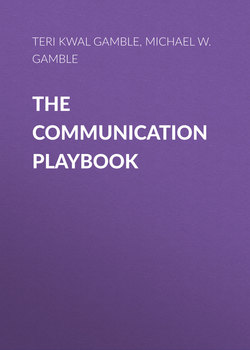Читать книгу The Communication Playbook - Teri Kwal Gamble - Страница 147
На сайте Литреса книга снята с продажи.
We Freeze Our First Impression
ОглавлениеHow important are first impressions—initial judgments of others? Do the snap judgments we make about others matter?
Research suggests that assessments we make during the first few minutes of meeting someone strongly influence the relationship’s course. Study results reveal that students who reported that another person made a positive first impression on them were more likely to develop a friendly relationship with that person, even if given only 3 minutes to make their initial evaluation. The results support the predicted outcome value theory developed by Mike Sunnafrank, which says that when we first meet another person, based on our first impression of the person, we are able to predict the probable outcome of our relationship.45
How do you form a first impression of someone? What makes you decide if you like or dislike someone? It turns out that people judge one another on two main qualities: warmth (whether they come across as friendly and well-intentioned) and competence (whether we think they have the ability to deliver on their intentions). We view positively those people we believe to possess both qualities, but develop negative perceptions toward other blends. For example, we tend to envy and even may wish harm to those we judge to be competent but cold, while people we see as warm but incompetent elicit pity.46
Because sometimes we rely on inaccurate mental shortcuts such as stereotypes, first impressions can dramatically affect perception. A first impression—or primacy effect, as it is sometimes called—even can affect the course or outcome of an event or relationship. And even if our first impressions are wrong, we tend to hold on to them—although doing so may be illogical. We may cling to an inaccurate first impression and reshape the conflicting information available to us until it conforms to the image we hold. As a consequence, we may never come to experience the real person—only our erroneous perception of him or her—and will base our responses to that person on that faulty conception.
Suppose, for example, a new employee, Kevin, is hired at work. You tell a good friend and coworker this, and your friend says, “Yeah, I know him. He worked in my unit 2 years back. He’s nothing but trouble—always looking to use people. He’ll bleed you of your ideas, pass them off as his own, and leave you behind as he builds a name for himself.” Your friend’s evaluation may be unfair, biased, or simply wrong. Kevin might have changed during the past 2 years, or your friend’s initial assessment of Kevin might be incomplete. But your friend’s words will likely influence how you interact with Kevin, and you’ll probably find reasons to substantiate your first impressions of him because you closed your mind once you formed it.
